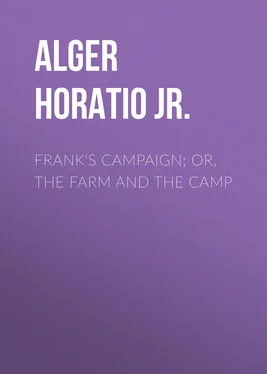Horatio Alger - Frank's Campaign; Or, The Farm and the Camp
Здесь есть возможность читать онлайн «Horatio Alger - Frank's Campaign; Or, The Farm and the Camp» — ознакомительный отрывок электронной книги совершенно бесплатно, а после прочтения отрывка купить полную версию. В некоторых случаях можно слушать аудио, скачать через торрент в формате fb2 и присутствует краткое содержание. Издательство: Иностранный паблик, Жанр: foreign_children, literature_19, foreign_antique, foreign_prose, на английском языке. Описание произведения, (предисловие) а так же отзывы посетителей доступны на портале библиотеки ЛибКат.
- Название:Frank's Campaign; Or, The Farm and the Camp
- Автор:
- Издательство:Иностранный паблик
- Жанр:
- Год:неизвестен
- ISBN:нет данных
- Рейтинг книги:3 / 5. Голосов: 1
-
Избранное:Добавить в избранное
- Отзывы:
-
Ваша оценка:
- 60
- 1
- 2
- 3
- 4
- 5
Frank's Campaign; Or, The Farm and the Camp: краткое содержание, описание и аннотация
Предлагаем к чтению аннотацию, описание, краткое содержание или предисловие (зависит от того, что написал сам автор книги «Frank's Campaign; Or, The Farm and the Camp»). Если вы не нашли необходимую информацию о книге — напишите в комментариях, мы постараемся отыскать её.
Frank's Campaign; Or, The Farm and the Camp — читать онлайн ознакомительный отрывок
Ниже представлен текст книги, разбитый по страницам. Система сохранения места последней прочитанной страницы, позволяет с удобством читать онлайн бесплатно книгу «Frank's Campaign; Or, The Farm and the Camp», без необходимости каждый раз заново искать на чём Вы остановились. Поставьте закладку, и сможете в любой момент перейти на страницу, на которой закончили чтение.
Интервал:
Закладка:
Mr. Frost in reply drew out a copious stream.
“I did the same as you,” said Frank, mystified, “and none came.”
“You didn’t take hold right,” said his father, “and you pressed at the wrong time. Let me show you.”
Before the first lesson was over Frank had advanced a little in the art of milking, and it may as well be said here that in the course of a week or so he became a fair proficient, so that his father even allowed him to try Vixen, a cow who had received this name from the uncertainty of her temper. She had more than once upset the pail with a spiteful kick when it was nearly full. One morning she upset not only the pail, but Frank, who looked foolish enough as he got up covered with milk.
Frank also commenced reading the Plowman, a weekly agricultural paper which his father had taken for years. Until now he had confined his readings in it to the selected story on the fourth page. Now, with an object in view, he read carefully other parts of the paper. He did this not merely in the first flush of enthusiasm, but with the steady purpose of qualifying himself to take his father’s place.
“Frank is an uncommon boy,” said Mr. Frost to his wife, not without feelings of pride, one night, when our hero had retired to bed. “I would trust him with the farm sooner than many who are half a dozen years older.”
CHAPTER VII. LIKE FATHER, LIKE SON
“Well, father, I’ve got some news for you,” said John Haynes, as he entered his father’s presence, two or three days later.
“What is it, John?” inquired the squire, laying down a copy of the New York Herald, which he had been reading.
“Who do you think has enlisted?”
“I do not choose to guess,” said his father coldly. “If you feel disposed to tell me, you may do so.”
John looked somewhat offended at his father’s tone, but he was anxious to tell the news. “Frost’s going to enlist,” he said shortly.
“Indeed!” said the squire, with interest. “How did you hear?”
“I heard him say so himself, just now, in the store.”
“I expected it,” said Squire Haynes, with a sneer. “I understood his motives perfectly in urging the town to pay an enormous bounty to volunteers. He meant to line his own pockets at the public expense.”
“He says that he doesn’t mean to accept the bounty,” continued John, in a tone which indicated a doubt whether Mr. Frost was in earnest.
“Did you hear him say that?” asked Squire Haynes abruptly.
“Yes, I heard him say so to Mr. Morse.”
“Perhaps he means it, and perhaps he doesn’t. If he don’t take it, it is because he is afraid of public opinion. What’s he going to do about the farm, while he is gone?”
“That is the strangest part of it,” said John. “I don’t believe you could guess who is to be left in charge of it.”
“I don’t choose to guess. If you know, speak out.”
John bit his lip resentfully.
“It’s that conceited jackanapes of his—Frank Frost.”
“Do you mean that he is going to leave that boy to carry on the farm?” demanded Squire Haynes, in surprise.
“Yes.”
“Well, all I can say is that he’s more of a fool than I took him to be.”
“Oh, he thinks everything of Frank,” said John bitterly. “He’ll be nominating him for representative next.”
The squire winced a little. He had been ambitious to represent the town in the legislature, and after considerable wire-pulling had succeeded in obtaining the nomination the year previous. But it is one thing to be nominated and another to be elected. So the squire had found, to his cost. He had barely obtained fifty votes, while his opponent had been elected by a vote of a hundred and fifty. All allusions, therefore, recalling his mortifying defeat were disagreeable to him.
“On the whole, I don’t know but I’m satisfied,” he said, recurring to the intelligence John had brought. “So far as I am concerned, I am glad he has made choice of this boy.”
“You don’t think he is competent?” asked John, in surprise.
“For that very reason I am glad he has been selected,” said the squire emphatically. “I take it for granted that the farm will be mismanaged, and become a bill of expense, instead of a source of revenue. It’s pretty certain that Frost won’t be able to pay the mortgage when it comes due. I can bid off the farm for a small sum additional and make a capital bargain. It will make a very good place for you to settle down upon, John.”
“Me!” said John disdainfully. “You don’t expect me to become a plodding farmer, I trust. I’ve got talent for something better than that, I should hope.”
“No,” said the squire, “I have other news for you. Still, you could hire a farmer to carry it on for you, and live out there in the summer.”
“Well, perhaps that would do,” said John, thinking that it would sound well for him, even if he lived in the city, to have a place in the country. “When does the mortgage come due, father?”
“I don’t remember the exact date. I’ll look and see.”
The squire drew from a closet a box hooped with iron, and evidently made for security. This was his strong-box, and in this he kept his bonds, mortgages, and other securities.
He selected a document tied with red ribbon, and examined it briefly.
“I shall have the right to foreclose the mortgage on the first of next July,” he said.
“I hope you will do it then. I should like to see them Frosts humbled.”
“THEM Frosts! Don’t you know anything more about English grammar, John?”
“Those Frosts, then. Of course, I know; but a feller can’t always be watching his words.”
“I desire you never again to use the low word ‘feller,’” said the squire, who, as the reader will see, was more particular about grammatical accuracy than about some other things which might be naturally supposed to be of higher importance.
“Well,” said John sulkily, “anything you choose.”
“As to the mortgage,” proceeded Squire Haynes, “I have no idea they will be able to lift it. I feel certain that Frost won’t himself have the money at command, and I sha’n’t give him any grace, or consent to a renewal. He may be pretty sure of that.”
“Perhaps he’ll find somebody to lend him the money.”
“I think not. There are those who would be willing, but I question whether there is any such who could raise the money at a moment’s warning. By the way, you need not mention my purpose in this matter to any one. If it should leak out, Mr. Frost might hear of it, and prepare for it.”
“You may trust me for that, father,” said John, very decidedly; “I want to see Frank Frost’s proud spirit humbled. Perhaps he’ll feel like putting on airs after that.”
From the conversation which has just been chronicled it will be perceived that John was a worthy son of his father; and, though wanting in affection and cordial good feeling, that both were prepared to join hands in devising mischief to poor Frank and his family. Let us hope that the intentions of the wicked may be frustrated.
CHAPTER VIII. DISCOURAGED AND ENCOURAGED
In a small village like Rossville news flies fast. Even the distinctions of social life do not hinder an interest being felt in the affairs of each individual. Hence it was that Mr. Frost’s determination to enlist became speedily known, and various were the comments made upon his plan of leaving Frank in charge of the farm. That they were not all favorable may be readily believed. Country people are apt to criticize the proceedings of their neighbors with a greater degree of freedom than is common elsewhere.
As Frank was on his way to school on Saturday morning, his name was called by Mrs. Roxana Mason, who stood in the doorway of a small yellow house fronting on the main street.
Читать дальшеИнтервал:
Закладка:
Похожие книги на «Frank's Campaign; Or, The Farm and the Camp»
Представляем Вашему вниманию похожие книги на «Frank's Campaign; Or, The Farm and the Camp» списком для выбора. Мы отобрали схожую по названию и смыслу литературу в надежде предоставить читателям больше вариантов отыскать новые, интересные, ещё непрочитанные произведения.
Обсуждение, отзывы о книге «Frank's Campaign; Or, The Farm and the Camp» и просто собственные мнения читателей. Оставьте ваши комментарии, напишите, что Вы думаете о произведении, его смысле или главных героях. Укажите что конкретно понравилось, а что нет, и почему Вы так считаете.












